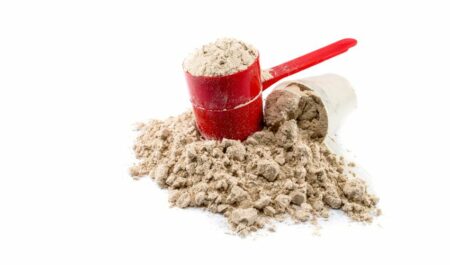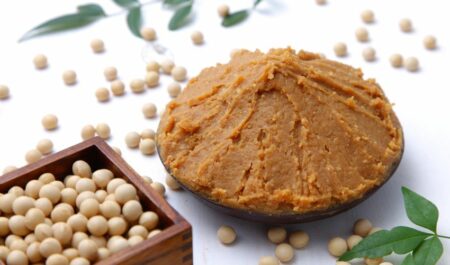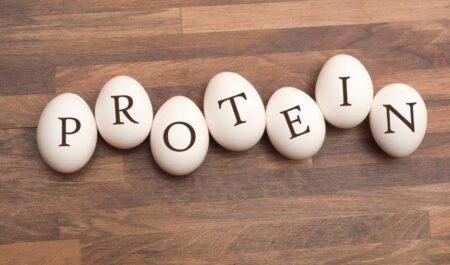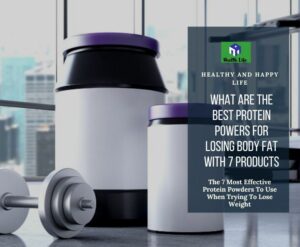.People who wish to increase their muscle mass and their strength have been drawn to protein powders for a long time. However, they are also useful for those who are trying to reduce their body weight. In here, we are going to explorer to find, what are the best protein powder for losing weight with list of 7 products.
These powders have various benefits for weight reduction, including the ability to reduce hunger, in addition to being a handy and palatable method to improve your protein consumption.
They are either dairy- or plant-based forms of protein that are extremely concentrated, and they may contain other chemicals that help with weight reduction as well.
The following is a list of the seven finest protein powders for shedding pounds.

1. Protein With Coffee Flavored
There is a wide variety of flavor options available for protein powder, including snickerdoodle, birthday cake, cookies and cream, and more.
Include in the mixture protein powders with a coffee taste, as these powders frequently contain coffee grounds, which are rich in the stimulant caffeine and can help to speed up the metabolism.
One scoop (36 grams) of this mocha-flavored whey protein from Dymatize, for example, includes 25 grams of protein and 113 mg of caffeine, which is somewhat higher than the amount of caffeine found in an average cup of coffee containing 8 ounces (237 ml).
Caffeine, in addition to speeding up your metabolism, helps you maintain your endurance during physical activity, which in turn enables you to shed more fat and calories.
Because of this, coffee-protein blends are an ideal snack to have thirty to sixty minutes before engaging in physical activity.
Additionally, the protein found in these items can help you lose weight by suppressing your appetite, which in turn makes it easier for you to reduce the number of calories that you take in on a daily basis.
However, you should carefully check the nutrition label before purchasing any coffee-flavored protein powder because not all of them include caffeine.
2. Whey Protein.

Whey protein is perhaps the protein powder that is used the most frequently nowadays. Whey is one of the two proteins that may be found in milk; the other is casein.
Whey protein is frequently consumed after exercise for the purposes of both muscle development and recuperation since it is simple for the body to digest and absorb.
Whey protein has traditionally been used to assist in the growth of muscle; however, a large number of studies now show that it may also assist with weight reduction.
This supplement made by Optimum Nutrition provides 24 grams of whey protein in each scoop (30 grams), which may assist both the growth of muscle and the reduction of body fat.
People who supplemented with whey protein lost more weight and increased more muscle mass than those who did not take the supplement, according to a study of nine separate research that looked at the topic.
According to the same analysis, people who consumed whey protein showed substantial improvements in their blood pressure, their ability to regulate their blood sugar, and their cholesterol levels.
The appetite-suppressing effects of whey protein, which help you feel fuller for longer periods of time throughout the day, are the primary cause of these weight reduction advantages.
3. Casein Protein.
Casein, the second protein found in milk, is absorbed considerably more slowly than whey, but it shares many of whey’s qualities related to weight reduction.
When casein protein is exposed to the acids in your stomach, curds are formed. This indicates that it will take your body a significant amount of time, often between six and seven hours, to digest and absorb it.
Casein, on the other hand, has a relatively slow digestion rate, which might help you eat less by reducing your hunger.
In one research, 32 men were given the option of consuming either a carbohydrate drink or a protein made from casein, whey, egg, or peas thirty minutes before eating an unlimited meal. The researchers found that casein had the greatest effect on fullness and led to the lowest amount of calorie consumption.
However, not all investigations come to the same conclusion.
People who ingested whey protein 90 minutes before to dining at a buffet had less hunger and consumed less calories than those who consumed casein protein. This finding was found in a separate research.
Based on these findings, it seems that the optimal time to consume casein in comparison to whey protein is 30 minutes, as opposed to 90 minutes, before a meal. However, in order to properly evaluate casein in comparison to whey and other protein powders, further study is required.
Calcium is another mineral that may be found in abundance in casein.
For instance, one scoop of this casein protein powder made by Optimum Nutrition offers sixty percent of your recommended daily intake of calcium (34 grams).
Several observational studies have found a correlation between a greater calcium intake and a lower body weight; however, this effect has not yet been seen in randomized controlled trials, which are considered to be the gold standard of scientific evidence.
4. Protein From Soybeans.

One of the few proteins derived from plants, soy protein is unique in that it contains all nine of the essential amino acids that are required for human health.
As a result of this, it is an excellent source of protein that is appealing to those who can’t stomach the proteins found in milk products.
It has been demonstrated that this has an influence on one’s appetite.
In one study, men were offered pizza one hour after eating whey, soy, or egg white protein, and then the men were asked to rate their hunger.
Although whey protein was related with the highest decrease in appetite, soy protein was more efficient than egg white protein at both lowering appetite and the quantity of calories that were ingested. Egg white protein was also connected with the biggest decrease in appetite.
It has also been demonstrated that the protein found in soy is beneficial to women.
In one experiment, women who had passed menopause were randomly assigned to consume either 20 grams of a soy or casein protein drink once day for three months.
This amount of soy protein is equivalent to that which may be found in one scoop of EAS soy protein powder.
Those who consumed soy had a greater reduction in abdominal fat than those who drank casein, although the difference was not statistically significant.
When it came to helping people lose weight, another research revealed that the effects of soy protein were equivalent to those of other forms of protein when they were consumed as part of a meal replacement program that was low in calories.
5. Protein That Has Been Supplemented With Fiber.
The highest concentrations of dietary fiber may be found in meals derived from plants, including vegetables, fruits, legumes, and grains.
If you consume an adequate amount of fiber in your diet, you may achieve a healthy weight, normalize your bowel movements, reduce your cholesterol levels, and better regulate your blood sugar levels, which is especially helpful for those who have type 2 diabetes.
Fiber, like protein, has been demonstrated to reduce the amount of food consumed, which in turn leads to a reduction in overall body weight.
Unfortunately, the production of plant-based protein powder involves the removal of a significant portion of the fiber, if not all of it.
On the other hand, some plant-based mixed protein powders include fiber as an added ingredient. The protein in such goods comes from a variety of sources, including peas, rice, chia seeds, and garbanzo beans, among others.
When combined, protein and fiber provide a synergistic impact that is more effective in assisting with weight reduction than any component would be on its own.
You should look for blended plant-based protein mixes that contain more than 5 grams of fiber in each meal.
For instance, each 43-gram scoop of Garden of Life’s Fit meal replacement has 9 grams of fiber in addition to 28 grams of protein derived from a variety of plant-based sources.
In a similar vein, each serving of this protein powder from Orgain provides you with 21 grams of protein in addition to 7 grams of fiber (46 grams).
6. The Protein Found In Egg Whites

Egg white protein is a viable alternative to milk protein for those who detest milk proteins or who are unable to handle them.
Although the yolk contains the majority of the egg’s nutrients, only the whites can produce egg white protein, contrary to what the name may lead one to believe.
Powdered chicken egg whites that have been dried are the starting material for this product.
Egg white protein supplements, like this one made by NOW Sports, go through a procedure called pasteurization before being sold to customers.
This eliminates the risk of Salmonella and deactivates a protein known as avidin, which limits the absorption of the B vitamin biotin by binding to it and preventing it from being absorbed.
Although the effect of egg white protein on hunger is not as significant as that of whey or casein, studies shows that it can still help you consume fewer calories, which can benefit in your efforts to lose weight. Egg white protein is found in eggs.
7. Protein From Peas
Pea protein, like soy protein, is considered to be a complete protein since it has all nine of the necessary amino acids.
Due to the fact that it is deficient in a number of necessary amino acids, the amino acid profile of pea protein cannot be compared to that of protein powders derived from dairy.
Yellow peas are the primary ingredient in the production of pea protein powder, such as that sold by Naked Nutrition.
Because it is hypoallergenic, folks who have sensitivities or allergies to milk, soy, or eggs can choose to consume it without worry.
In addition, pea protein powder is an excellent plant-based alternative to dairy-based proteins for the purpose of assisting in the process of weight reduction.
One study that looked at the relationship between protein and satiety had the participants eat 20 grams of a carbohydrate drink or casein, whey, pea, or egg protein thirty minutes before a meal.
Pea protein demonstrated a considerable effect on suppressing hunger, which led to individuals ingesting less calories overall. Only casein showed a stronger influence on appetite than pea protein did.
Pea protein does not have a taste similar to that of mashed peas; rather, it has an earthy flavor that may not appeal to everyone.
If this is the case, Naked Nutrition provides a pea protein powder with a chocolate flavor that is far more appealing to consumers.
Protein Powders Are Only One Of Several Tools That Might Help You Lose Weight.
Creating a calorie deficit is the most important factor to consider when it comes to successful weight loss.
When you ingest less calories than your body burns off, this results in a calorie deficit. Eating fewer calories overall, increasing the number of calories burned through exercise, or doing a combination of the two are all viable options for achieving this goal.
There are some benefits to increasing your protein intake once you have established a calorie deficit. Protein powders can help you increase your protein intake, which is one of the benefits.
- Increasing the amount of protein you consume can assist you in losing weight by:
- Increasing the sensation of fullness: Consuming protein makes you feel fuller for a longer period of time, which in turn can lead to eating less and a reduction in overall body weight.
- Protein, in comparison to carbohydrates or fat, burns the most calories during digestion and use. This causes an increase in metabolic rate. Therefore, increasing the amount of protein you consume might lead to an increase in the amount of calories you burn.
- Maintaining your muscle mass is important since weight loss often results in a loss of both fat and muscle. Along with resistance exercise, getting a proper amount of protein in your diet might help you keep your muscle mass and burn more fat.
However, using protein powders by themselves will not assist you in achieving your weight loss goals. By reducing the amount of food you consume, they only make dieting easier.
The Final Thought
Protein powders are used by a lot of people who want to gain muscle, but they can also help people who are trying to lose weight.
Proteins derived from whey, casein, and eggs, as well as plant-based sources such as soy and pea, are all great options for persons who are trying to reduce their body fat percentage.
Some of these protein powders are enhanced with other components, such as caffeine and fiber, that can also play a role in assisting with weight reduction.
Although using these items can help you lose weight, you will get the best benefits if you also follow a healthy, low-calorie diet and engage in regular physical activity in addition to using these products.
